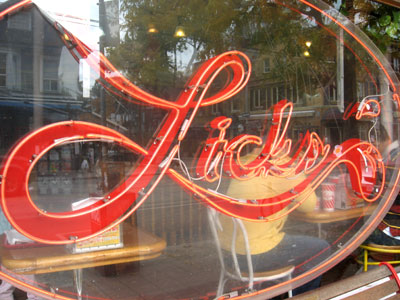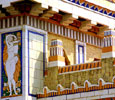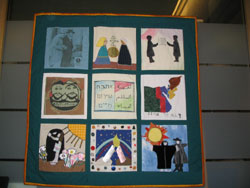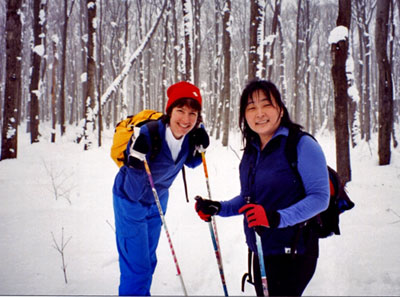One person who has been extremely supportive of my “Celebrate Toronto” project is Provincial Member of Parliament, Michael Prue. He and his staff have connected me with various individuals in the Beach who are good candidates for my first Toronto neighbourhood portrait. Way back in November I was invited to come out to lunch with him and his team and Michael and I even recorded a joint Rogers television show together. He came across as a very open and friendly individual with a bright smile and a boyish charm, and I thought Michael himself might be a good candidate for an interview so people in his riding, “Beaches – East York”, could get to know him from a more personal point of view. So we arranged to meet at the Boardwalk Café on Toronto’s waterfront, in the Woodbine Beach area. For a few hours I had a chance to pick his brain and ask away while Michael freely opened up to me.
Michael is one of those rare Torontonians whose family tree is anchored for several generations in the Toronto area. Toronto is one of the few cities where the majority of people were born somewhere else (myself included) and immigrated here. Not so with Michael. Both his parents were born in Toronto, six out of eight of his great grandparents were from Toronto. He traces his roots back to Irish / English / Scottish immigrants generations ago and some of his relatives have a bible with Laura Secord’s name in it. (Laura Secord warned the British Army of the advancing Americans during the War of 1812.). Another side of his family is related to the Thompson family in Scarbourough – David and Mary Thompson were some of the pioneers who opened up land to the east of today’s metropolis. A grandfather on his mother’s side was actually from Montreal of Irish and French background. His paternal great grandfather’s name was Proulx and that name was later anglicized to Prue.
Michael was born at Women’s College Hospital and grew up in a tenement building on Oak Street. That’s where Michael spent the first four years of his life before the tenements were torn down and Regent Park, Toronto’s most (in)famous public housing project was built. Families who were living in the area before the housing project was built had first dibs on some of the apartments that were going up in the new housing complex.

Michael Prue’s father was born in 1921 and had a very difficult time finding work during the Depression. He quit school in 1936 to work in various odd jobs. In 1939, when World War II started, he was one of the first to volunteer for the Canadian Army and was sent to the battlefields of Europe. His father often talked about his experiences in Europe and the places he had seen: North Africa, Italy (he fought at Montecassino), Germany, Holland, Denmark, and England/Scotland/Wales. Michael recalls his father talking often about the places, but very rarely about the war itself. He still remembers one of the highlights: a story of his father finding a secret stash of wine in Italy.
After the war Michael’s father worked on Queen Street at a factory that produced rubber components. His job as a regular factory worker was later followed up by a position as a janitor which he held until retirement. Michael’s mother stayed home with her children until Michael was about 12 years old and then started to work as a part-time bookkeeper.
Growing up in a working-class family in Regent Park shaped Michael’s outlook on life a great deal. His family was doing better than average in this neighbourhood considering that many families in Regent Park were single-parent low-income households. Once he entered high school, things started to change. Michael attended Jarvis Collegiate which at the time was attended largely by children from Toronto’s affluent Rosedale neighbourhood.
Michael was one of the few people who attended an academic high school, most of the boys he grew up with ended up at Central Tech while the girls attended Central Commerce, preparing them for work in the trades or in lower-level administrative jobs. Only 8 or 10 of Michael’s colleagues went to Jarvis Collegiate, but Michael said the class differences during his high school years were almost insurmountable. Despite the fact that he was on student council, he never got invited to dances or special events, and that experience of being excluded on the basis of his social class made him feel “a little bitter towards rich people”. He admits that he still works on overcoming this feeling to this day.

Michael Prue and Mary Abbinante from Ups and Downs Swimwear in the Beach
This is also what attracted him to the ideology of the NDP, a party whose constitution states “we will invite the co-operation of all persons who are dedicated to the extension of freedom, the abolition of poverty and the elimination of exploitation”. Of his schoolmates Michael was the only one to go on to postsecondary education, and many people ask him today why he is so determined to fight for underprivileged individuals if he himself has done well. To that he responds that he has seen how so many people have gotten shafted based on their economic (or ethnic or racial) background, and that’s why he continues to fight on their behalf to this day.
His university career includes an Honours Bachelors degree in Political Science and Anthropology from the University of Toronto and a Masters degree in Canadian Studies and Political Science/Anthropology from Carlton University in Ottawa. When I asked Michael what “Canadian Studies” is he explained that it encompasses Canadian literature, geography and history. Although he was accepted by various other universities for his masters program he liked Carlton because he wanted a broader education than just political science. At this Ottawa university Michael also had the opportunity to improve his French language skills.
After completing university he got two job offers on the same day: he was offered a one-year contract position as chief lobbyist with the Independent Publishers Association where he would have been supervising a staff of 5 people. Not bad for a 25-year old straight out of university.
His second job opportunity was as an immigration officer, and after consulting with his future wife he ended up accepting the job with Immigration Canada, particularly since it was a long-term opportunity with the Federal Government. Over his 20 year career with the Immigration Department Michael accumulated numerous interesting stories and anecdotes. He initially worked as an immigration officer at the airport and in 1973 – 1974 there was a lot of illegal immigration from various third world countries. People would arrive pretending to come here as tourists and then disappear and work illegally, jumping ahead of the queue of immigrants who had followed the proper procedures.

Joe and Mary Abbinante, merchants in the Beach, and Michael Prue
Often the job of an immigration officer is quite sad, because by definition it involves splitting families apart. Immigration officers have to assess cases in the family reunification category, and Michael recalls one story where a woman tried to bring in her elderly father who had cancer. Michael declined the application due to the certain costs for the Canadian health care system, knowing that this woman would never see her father again. He compares it to being a doctor, having to make tough decisions that affect people’s lives, but needing to remain emotionally detached.
His university studies in anthropology came in handy several times when he was dealing with refugee claimants from various third world countries. Michael asked some probing questions as to the kinship system in the refugee claimant’s family. Which side of the family, the mother’s side or the father’s side, would be responsible for looking after off-spring if the parents died? His extensive knowledge of matrilineal, patrilineal and other kinship systems of different societies around the world made one lawyer withdraw a refugee claim on behalf of his client. Michael simply knew too much about local family structures and lineages for his client to get away with bogus claims.
Michael also explained that deportations happen to Canadian immigrants from other countries when they commit serious crimes in their new home country. He indicated that anecdotally, along with his colleagues they thought that about half of them were from Jamaica. They were not allowed to keep stastistics. According to Michael, there is actually a sociological reason behind some of the crime problems in the Jamaican-Canadian community: during the 1960s Canada imported a large number of female immigrants from Jamaica to work as domestic servants and nannies. These women had to be single, have a grade 9 education, speak English and have “no issue”, i.e. they were not allowed to have children to qualify for this program.

View of some merchants on Queen Street East
Many hundreds of Jamaican woman arrived in the 1960s, seeking a better life in Canada. In the 1970s, after they had become Canadian citizens, they started to send for their children, since so many of these women indeed had one or even more children who had actually been raised by aunts, cousins or other family members. As a result of the missing parental attachment, many of these children had grown up without much discipline and little education. In Caribbean families it is often the mother that holds the family together, and once she is gone the family falls apart.
So when these young Jamaican people arrived in Canada to be reunited with their mothers they saw all this wealth around them, they realized their lack of opportunities as new immigrants with few immediate job prospects, and they became resentful. In the end it was Canada’s immigration policy that caused this problem which continues to cast its shadows today.
I asked Michael why he made a move into politics. He explained that politics had always been in his blood and recalls an incident that happened when he was about six years of age. He had gone on an outing with his parents to Riverdale Park, which at that time was the location of the Toronto Zoo. All of a sudden Michael had disappeared and his parents were frantically searching for him in the crowd of people. His father finally found him, admiring a man on a soap box who was sharing his philosophies in front of many onlookers.
Not only does Michael enjoy public speaking, but he also wants to make a sincere difference, particularly for the less fortunate people in society. During his last few years with the Immigration Department he ran six times for politics and won twice and became a Councillor in the former Borough of East York, which since our municipal amalgamation on January 1, 1998 is part of the City of Toronto.

Licks – Good eats in the Beach




